Events of the 1980s
The End of the Cold War
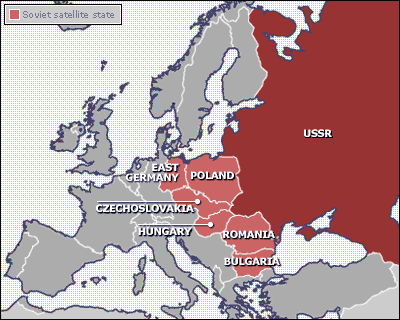 The Soviet Bloc:
The Soviet Bloc:Began in Poland in June of 1989, when Poland began a non-communist opposition government in its legislature. Most people thought that the Soviets would not allow this new government to take power, but Gorbachev refused to act on the matter.
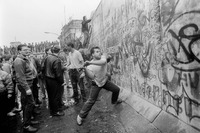 The Berlin Wall:
The Berlin Wall:The communist government of the German Democratic Republic built a concrete wall, after a barbed wire fence was used, between East and West Berlin. The original idea behind this was to keep Western Fascists from entering East Germany and spreading their anti-communist ideas.
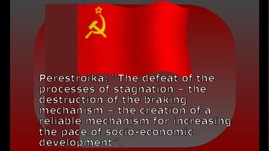 Glasnot and Perestroika:
Glasnot and Perestroika:Mikhail Gorbachev introduced these in hopes to improve the economy by allowing limited market incentives to citizens of the Soviet Union.
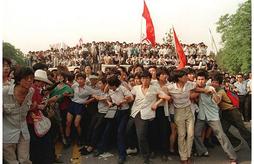 Tiananmen Square Massacre:
Tiananmen Square Massacre: On June 4, 1989, students who were protesting in Beijing were fired at by the Chinese communists government. There were many deaths.
Reaganomics
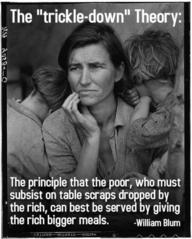 Trickle-Down Economics:
Trickle-Down Economics:The idea that giving tax breaks and money to the wealthy upper class, and businesses will benefit the whole economy and ultimately help the lower class. Most will argue that this is only an excuse to benefit the rich, and leave the poor behind.
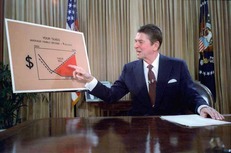 Tax cut for the wealthy:
Tax cut for the wealthy:Reagan proposed a 30% tax cut that was for the upper class, and he it had no benefit to the majority of people who are classified as the middle or lower class.
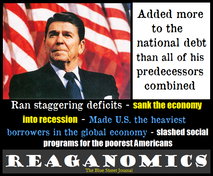 Triple the national debt:
Triple the national debt:Under his presidency, the U.S. national debt tripled, and he minimized the amount of social welfare programs.
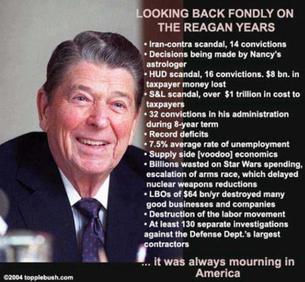 Bad or Good Reputation??
Bad or Good Reputation??While Reagan was popular at the beginnig of his presidency, he gained a bad reputation toward the end of his administration as a result of major reforms. This led to the spread of untrue statistics and figures. The inflation and unemployment rates actually decreased from the beginnig of his presidency in 1981. His reputation was also damaged after he prohibited kids with AIDS from attending school, which did not contain the spread of AIDS anyways.
Technological Revolution
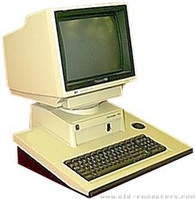 Personal Computers (PC):
Personal Computers (PC):The first PC was released in 1981 by IBM, and it was not until 1984 that a mouse was used, and in 1985 the first version of the windows operating system was invented.
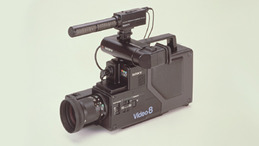 Personal Camcorders:
Personal Camcorders:In 1980, Sony invented the first camcorder that was affordable for the middle class.
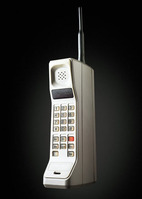 Cell Phones:
Cell Phones: By 1983, there were 11.2 million cell phone subscribers. People could now communicate with each other much easier than ever before.
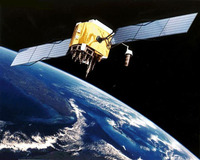 Global Positioning System (GPS):
Global Positioning System (GPS):The first GPS satellite was placed into orbit in 1989.
Terrorism
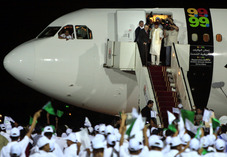 Libyan threat:
Libyan threat:The Libyan leader had planned to assassinate American diplomats in Europe, and Reagan ultimately ordered the Navy Jets to shoot down Libyan fighters if they crossed the "Line of Death."
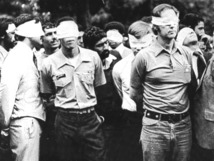 Hostages in Tehran:
Hostages in Tehran:52 Americans held hostage when Islamic radical students decided to storm the embassy in Tehran, which later led to the oil embargo under Carter's presidency.
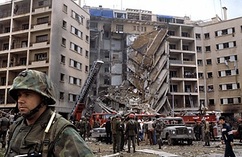 U.S. Embassy in Kuwait bombed:
U.S. Embassy in Kuwait bombed:On December 12, 1983, the Embassy building in Kuwait was bombed. Six were killed including a suicide bomber, and over 80 people were injured severely, and 17 people were arrested in Kuwait.
 William Buckley (CIA) Kidnapped by Islamic Extremists:
William Buckley (CIA) Kidnapped by Islamic Extremists:On March 16, 1984, Buckley was the fourth person to be captured in Lebanon, and died as a hostage. Reagan covered up the fact that he was sending arms to nations that supported terrorism in exchange for the release of hostages, and this scandal was later uncovered and was seen as a horrible failure by America and its policy that says to refuse to make diplomatic negotiations with other countries.
http://www.history.com/topics/1980s/speeches/radio-grenada-urges-citizens-to-oppose-us-invasion?m=52af5724c3c2e&s=undefined&f=1&free=false
Copy and paste the URL in red, to the right in a new window to hear an audio sample of the Grenada invasion.
